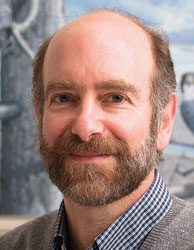Pressing Environmental Questions to be Explored at MBL Fall Seminar Series

Contact: Gina Hebert 508-289-7725, ghebert@mbl.edu
WOODS HOLE, MA—A lecture exploring the potentially enormous health dividends that could be realized from lowering greenhouse gas emissions will kick off the 2013 MBL (Marine Biological Laboratory) Distinguished Scientist Seminar Series. Jonathon Patz, M.D., professor and director of the Global Health Institute at the University of Wisconsin in Madison will present "The Global Climate Emergency: Turning a Crisis into an Opportunity for Public Health" on Friday, September 13 at 3:00 PM in the Speck Auditorium, Rowe Building, 10 MBL St., Woods Hole. The public is invited to attend. The talk is sponsored by the MBL's Ecosystems Center.

The Distinguished Scientist Seminar Series is part of the Ecosystem Center’s Semester in Environmental Science (SES), a 15-week program that immerses undergraduate science students in an intensive semester of hands-on ecological science using a curriculum that approaches environmental science from an ecosystems perspective. The Distinguished Scientists Seminar Series gives SES students and the public an opportunity to meet and interact with some of the best practitioners of environmental science in the world.
For the past 15 years, Dr. Patz served as a lead author for the United Nations Intergovernmental Panel on Climate Change. He also co-chaired the health expert panel of the U.S. National Assessment on Climate Change. Dr. Patz has written more than 90 peer-reviewed scientific papers, a textbook addressing the health effects of global environmental change, and, most recently, a co-edited five-volume Encyclopedia of Environmental Health (2011). He has been invited to brief both houses of Congress and has served on several scientific committees of the National Academy of Sciences. Dr. Patz served as Founding President of the International Association for Ecology and Health.
In addition to directing the university-wide Global Health Institute, Dr. Patz has faculty appointments in the University of Wisconsin, Madison’s Nelson Institute, Center for Sustainability and the Global Environment and the Department of Population Health Sciences. He also directs the NSF-sponsored Certificate on Humans and the Global Environment.
Dr. Patz earned medical board certification in both Occupational/Environmental Medicine and Family Medicine and received his medical degree from Case Western Reserve University and his Master of Public Health degree from Johns Hopkins University.
The Distinguished Scientist Lecture Series will continue throughout the fall at the MBL. The remaining lectures in the series are:
September 20 — 3:00 PM, Speck Auditorium, Rowe Building, 10 MBL St., Woods Hole
Mary E. Power, University of California, Berkeley
“Food Webs in Warming Rivers”
October 25 — 3:00 PM, Speck Auditorium, Rowe Building, 10 MBL St., Woods Hole
Charles Vorosmarty, The City University of New York’s Environmental Crossroads Initiative; NOAA-Cooperative Remote Sensing Science and Technology Center
“Twenty-First Century Water Systems and the Hippocratic Oath”
November 1 — 3:00 PM, Lillie Auditorium, 7 MBL St., Woods Hole
Raymond Pierrehumbert, University of Chicago
" Much Ado (much too much ado) About Methane and Other Short Lived Climate Forcing Agents"
—###—
The Marine Biological Laboratory (MBL) is dedicated to scientific discovery and improving the human condition through research and education in biology, biomedicine, and environmental science. Founded in Woods Hole, Massachusetts, in 1888, the MBL is a private, nonprofit institution and an affiliate of the University of Chicago